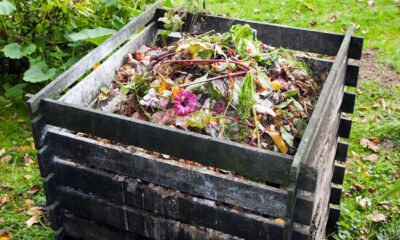

Energy
5 Tips for Creating a More Sustainable Property
For most of us, we own a small sliver of the world. Some of us have hundreds of acres, while others are lucky to have a small lot. However, regardless of how much land you have and many square feet your home is, you have a personal responsibility to care for the land you’ve been given. Are you doing a good job? Here are a few simple tips from ICC Property Management in Toronto that will help you manage your property:
Caring for Your Property
What does it really look like to care for your property? While mowing the grass, sweeping the floors, pulling weeds, and painting walls are all great things, the responsibilities you have go much deeper than this. You also have a duty to care for the property itself and ensure you’re doing everything possible to reduce your footprint and promote sustainability.
Here are a few ideas:
1. Plant a Sustainable Garden
One of the best things you can do is plant a garden. Not only do gardens enrich the soil, but they also provide a source of organic food that’s safe, healthy, and free. Regardless of whether you have 25 square feet or 25 acres, you can start a garden and begin harvesting in very little time. For smaller properties, raised bed gardens are the perfect solution.
2. Use ENERGY STAR Appliances
If you’re using old appliances – such as washers, dryers, refrigerators, and dishwashers – you’re most likely wasting energy every single day. While it may be expensive to replace appliances up front, the energy savings you enjoy down the road far outweigh any monetary expenses. If you’re looking for a little more information on the specific savings to be expected, check out this article by Energy.gov.
3. Create a Compost Station
What are you doing with things like grass clippings, leaves, and food waste? If you’re bagging them up and sending them to the dump, you’re unintentionally contributing to a global problem. Instead of throwing natural waste into the trashcan, create an outdoor compost station. If you’re growing a garden, you can use compost to enrich the soil with key nutrients.
4. Use More Sunshine and Less Artificial Light
There’s really no need to use a bunch of lamps during the daylight hours. If you constantly have lights turned on in various rooms throughout the house, think about whether this light is really necessary. By opening up blinds and allowing more natural light, you can reduce your dependence on electricity.
5. Seal Windows and Doors
If you live in an older home, it’s likely that your windows and doors aren’t as good as they once were. While they may keep the chill or heat from entering the home, old windows and doors tend to have small gaps around them. When you combine all of these little gaps, it’s like leaving a window open permanently. This means you’re letting expensive hot air escape during the winter and expensive cold air escape during the summer. Simply caulking and insulating can reduce your energy consumption.
Be a Responsible Steward of the Land
If you take a step back and look at property ownership from a new perspective, it quickly becomes apparent that you don’t really own any land. You’re simply the individual charged with keeping it for 10 years, 50 years, or 75 years. In the grand scheme of things, your ownership of the land is nothing more than a tiny blip on the radar of time. When you understand this, you can start to look differently at your property. You’re here to steward it until the next person takes over. So, it’s time to become a selfless steward.


 Environment12 months ago
Environment12 months agoAre Polymer Banknotes: an Eco-Friendly Trend or a Groundswell?

 Features11 months ago
Features11 months agoEco-Friendly Cryptocurrencies: Sustainable Investment Choices

 Features12 months ago
Features12 months agoEco-Friendly Crypto Traders Must Find the Right Exchange

 Energy11 months ago
Energy11 months agoThe Growing Role of Solar Panels in Ireland’s Energy Future





























